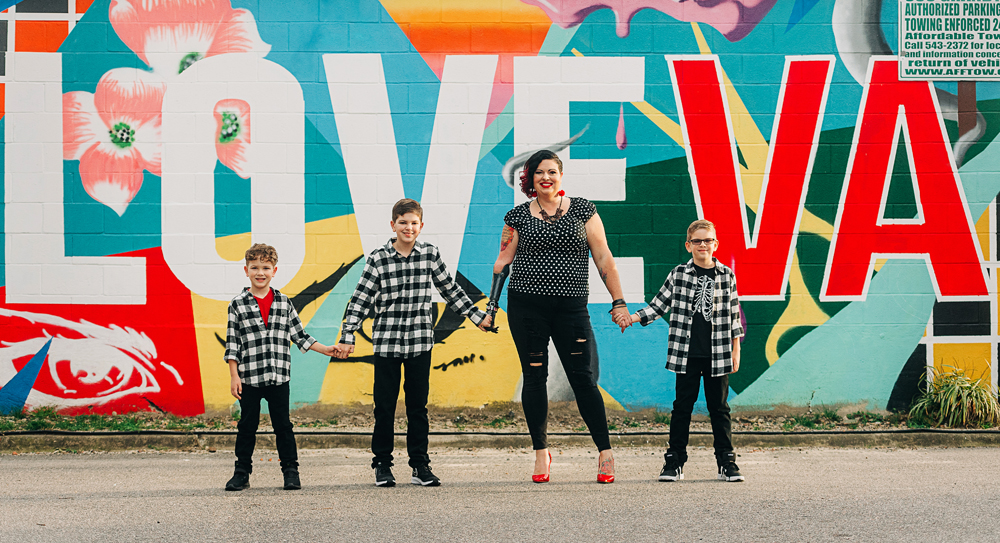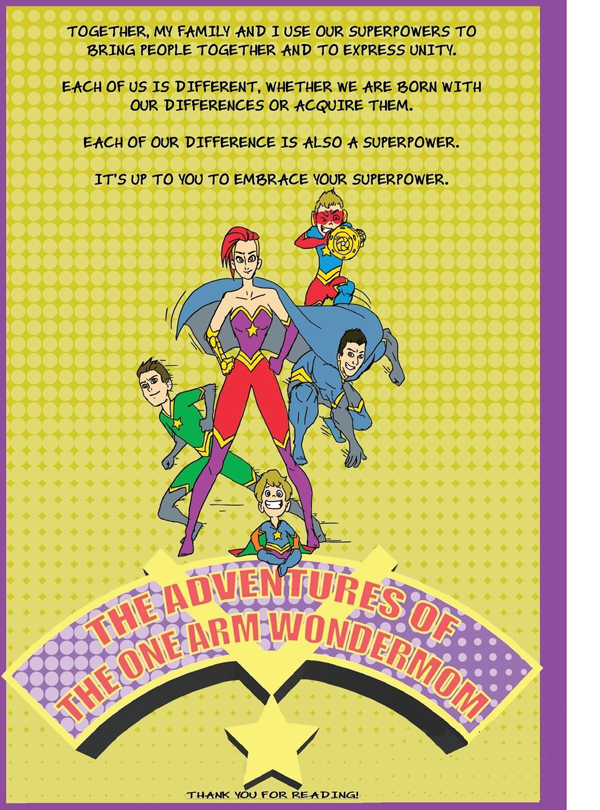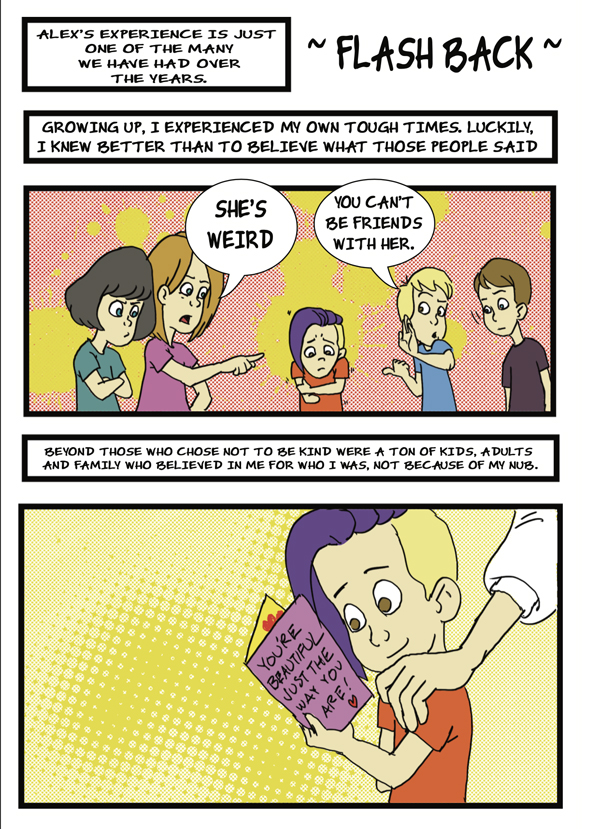Kim Stumbo is no regular superhero. She’s a Wondermom.
by Élan Young

Kim Stumbo always knew she wanted to be a mom. Growing up as a congenital amputee (her right arm ends just below the elbow), she received incredible support from her own mother, who taught her that limb difference was not a deficit but rather a superpower.
When she was 18 and about to become a parent herself, Stumbo’s mom died suddenly. The loss filled her with fear and doubt about whether she was up to the task of raising children. What she didn’t realize was that the journey into motherhood would provide an opportunity to put her superpowers to greater use, not just for herself, but for other amputee parents as well.
Now the head of a thriving family with three boys, Stumbo has developed boundless confidence in her ability to parent successfully with limb difference. She also takes deep satisfaction in her role. When she discovered the online community of amputees about five years ago, Stumbo found an outlet to share the rewards of her life as a mom and embolden other limb-different parents to embrace the experience of child-rearing with gusto and confidence.

And so was born her online persona: The One Arm Wondermom. As a social media creator, a public speaker, and the author and star of an illustrated book series, Stumbo offers an authentic view of the real-life ups and downs of amputee parenthood. In her own playful, sassy way, she shares the idea that limb difference can be empowering. It provides parents with a perspective and a set of life lessons that can help them raise healthy, well-adjusted, self-reliant kids. Above all, The One Arm Wondermom gives voice to Stumbo’s message that the greatest thing any amputee can give the world is to be themselves.
“I didn’t need to be a sports star,” she says, referring to the many amputee athletes who bring greater visibility to limb difference and disability. “I mean, it is absolutely wonderful that we have representation in that arena, but that was never my dream. I never had any want or need to do that. I wanted to grow up and be a mom, and I just didn’t see that reflected for me when I was younger.”
The Importance of Community
“My mom always directed me to use what I knew to help others,” says Stumbo. She applies that principle daily in her job as a certified occupational therapy assistant working with people who have debilitating illnesses or chronic conditions that affect their mobility and overall well-being. Having a limb difference helps Stumbo cultivate trust with her patients, many of whom find encouragement in her positive example and upbeat attitude.
Stumbo didn’t have that type of role model when she originally became a parent. At the time, she knew of no other limb-different moms, and she hadn’t yet connected with other amputees via social media. She had no choice but to tackle the challenges on her own and come up with solutions. “You figure out what works for you, what works for your baby,” she says.
Those early years of motherhood made Stumbo tougher. As she succeeded in solving the challenges of caring for one child, and then a second, her early fears about motherhood gave way to self-assurance. And she would need that quality to handle the complicated premature birth of her third child.

“I’d already been through the wringer as far as children go and all the things that can happen,” she says. “Then my third child was a preemie, so I had to navigate the NICU with a baby on oxygen.”
As her children got older, she got involved in the school’s parent-teachers’ association and neighborhood gatherings. “Friends just kept saying, ‘I don’t know how you do it, I have two hands and you do all this with just one,’” she recalls. “Because that’s what two-handed people say to you. It’s a very common statement.”
Stumbo never takes offense at these remarks, despite the traces of ableism that some of them carry. She chooses to receive them as compliments on her devotion to motherhood, which is a difficult—and underappreciated—job for all women, whether able-bodied or other-abled.
“We all do this stuff,” Stumbo says, referring to mothers in general. “We’re the ones that hold everybody together. We’re the ones who take care of everything, but we’re also the person that nobody really looks at as doing anything amazing. Yet we’re the reason people have support to be able to get through.
When she found the online limb-loss community about five years ago, her mom’s words of encouragement echoed forth and reminded Stumbo of her opportunity to help others. Once she found her tribe online, she began sharing her story through Facebook and her website. The response was encouraging, so she kept going. She launched an Instagram page and a YouTube channel. Eventually she hired an illustrator and wrote The Adventures of the One Arm Wondermom, the first volume in a planned series of books. She also had the opportunity to be part of a comic book collection, Super-Abled Comics Anthology 2019.
All of these endeavors have given Stumbo the chance to amplify her voice, spread her message to more people, strengthen the amputee community, and keep others from feeling the sense of isolation she encountered as a new parent with limb difference.
“Knowing you aren’t alone in this world makes a difference,” Stumbo says. “Knowing that there is at least one other person who can relate to your experiences as someone who is outside of typical helps during the hard times. That’s what having a community connection does.”
The Adaptive Advantage
Now a seasoned mom, Stumbo has a growing recognition of the myriad ways that being an adaptive parent has helped her children. Parenting with a limb difference offers true social and emotional benefits to her children, she believes. It has offered a way to introduce a greater sense of empathy to her children and to examine how people of all abilities are exceptional. She’s taught her children to accept all people regardless of difference, especially with respect to people with disabilities.
“I have so many stories of my children interacting with people of all ages and differences, and that makes my heart warm,” she says. “That’s what you want for your children—to be accepting and understanding and learn about each other.”
Stumbo has done most of her parenting without the aid of a prosthesis, but she uses one for assistance with certain activities, as a teaching tool, and even as a fashion accessory. Her children get an education every time they come along with her to her prosthetist’s office. “When they come with me to an appointment for fitting my prosthesis,” she says, “they get to see the socket, some of the software that is used for muscle testing, and the technology that helps make it all work,” she says.
While Stumbo’s parenting experience is full of rich reward, parents with a range of disabilities do encounter stigma. The Rehabilitation Act of 1973 and Title II of the Americans with Disabilities Act were written to protect parents and prospective parents with disabilities from unlawful discrimination in the administration of child welfare programs, activities, and services.
Nonprofit organizations like the Disabled Parenting Project offer additional support to parents with disabilities. Its website has resources on topics ranging from adaptive equipment to parenting techniques and policy. These resources are enormously helpful, but they can’t replace the value of a role model. That’s what Stumbo lost when her mom died, and what she wished she’d had in her earliest days as an amputee parent. And it’s why she’ll keep sharing her personal, powerful narrative as The One Arm Wondermom—to help other limb-different parents gain confidence that they can take on the challenges of child-rearing, and to uphold the values her own mother instilled in her.
“I knew as a child I had a superpower,” she says, “but it was not for everybody. It was for other kids with one hand. That’s how I felt I was helping.”
MOTHER’S NATURE
Words of wisdom from Kim Stumbo’s Instagram feed
APRIL 18, 2021
There is nothing more demeaning to a person with a disability or difference than pitying them—placing your own limitations upon them, because you assume they are limited, unhappy, or struggle 24/7. Luckily, society is seeing change and progression in its viewpoints on disability, not only from your typical able-bodied adults but also by those who are part of the disabled community. When I use the term “disability” and identify as an individual with a disability, it is more about the label. I know I’m different, but my difference has only taught me more things about life, people, and myself.
APRIL 7, 2021
My limb difference has never stopped me from doing anything. I may have to do it differently, but I still accomplished everything I ever chose or needed to do—and 99.9 percent of the time without help from others. So I didn’t see myself as limited or “disabled” (though I proudly associate with that word).
AUGUST 2020
Confidence is gained when you see others like yourself out there being seen. I grew up without social media, without being able to find others like myself to see how awesome we all are. I was truly on my own, living in a two-handed world, with no one else to confide in . . . . Not until the last few years finding, connecting [with], and actually meeting [people] with a wide range of disabilities and differences, did I finally see the truth and lose that “ableism shame” that we shouldn’t be seen as beautiful, sexy, normal women.



